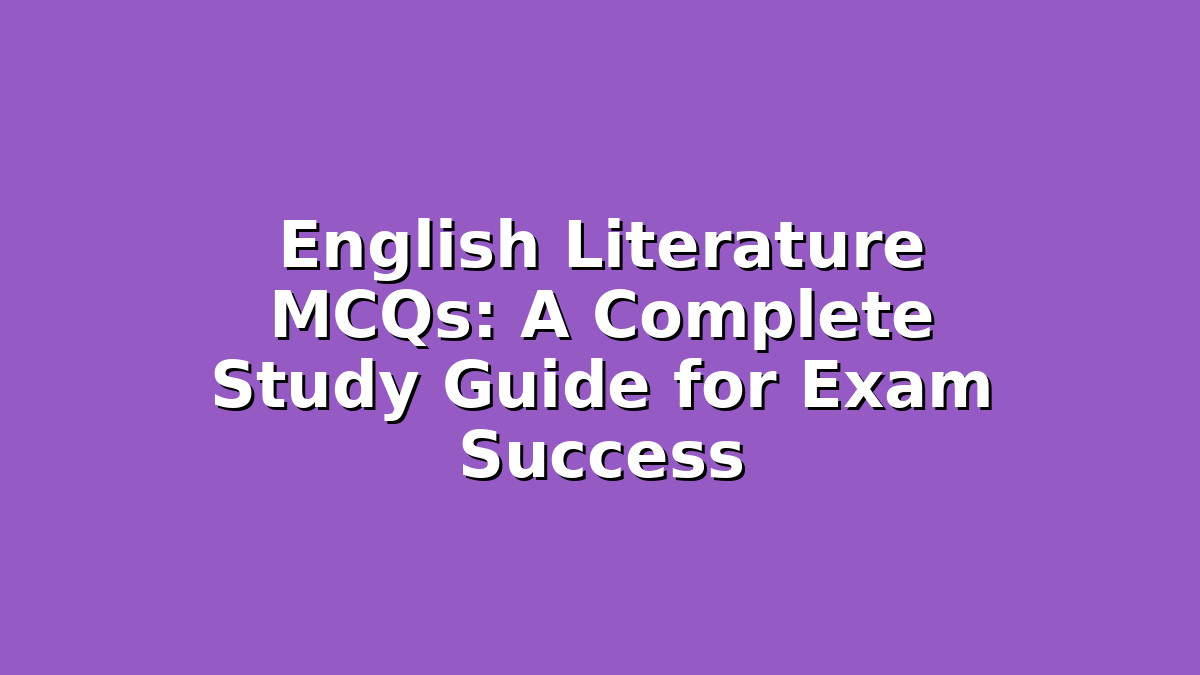Preparing for English Literature exams can feel overwhelming, especially when facing multiple-choice questions (MCQs) that test your understanding of complex texts, themes, and literary devices. Whether you’re a high school student aiming to ace your final exams or a college student tackling competitive tests, mastering English Literature MCQs requires strategy, practice, and a solid grasp of key concepts. This comprehensive guide will help you approach English Literature MCQs with confidence by offering practical study tips, effective techniques, and useful resources.
Understanding the Nature of English Literature MCQs
Before diving into study strategies, it’s important to understand what English Literature MCQs typically assess. These questions aren’t just about recalling facts; they test your analytical skills, interpretative abilities, and familiarity with literary terminology. You might encounter questions on:
– Plot and Character Analysis: Understanding the motivations, development, and relationships of characters.
– Themes and Motifs: Identifying central themes, underlying messages, and recurring motifs in texts.
– Literary Devices and Techniques: Recognizing metaphors, similes, symbolism, irony, and narrative styles.
– Contextual Knowledge: Historical, social, and cultural contexts that influence a work.
– Critical Perspectives: Familiarity with different critical approaches like feminism, Marxism, or psychoanalysis.
Recognizing these elements helps you prepare more strategically, focusing on the skills and knowledge areas that matter most.
—
Section 1: Building a Strong Foundation with Focused Reading and Note-Taking
The first step to mastering English Literature MCQs is developing a thorough understanding of the texts you’re studying. Reading is fundamental, but active, focused reading will make a huge difference.
1. Read with Purpose: Don’t just passively read the text. Instead, approach each reading session with questions in mind. What are the main themes? How do characters evolve? What literary techniques does the author use? Annotate the text as you read, highlighting passages that seem significant or confusing.
2. Create Concise Notes: After reading each chapter or section, jot down key points such as plot summaries, character profiles, and identified themes. Bullet points, mind maps, or charts can help condense information visually, making it easier to recall later.
3. Focus on Literary Devices: Keep a separate list of literary devices you encounter in your texts. Include definitions and examples from the work. For instance, if you find an example of symbolism, note what it symbolizes and how it contributes to the text’s meaning.
4. Revisit and Revise: Regularly review your notes to reinforce memory. Spaced repetition—reviewing material at increasing intervals—can boost retention and understanding.
By building a strong foundation through active reading and note-taking, you empower yourself to tackle MCQs that require more than surface-level knowledge.
—
Section 2: Mastering MCQ Techniques Through Practice and Analysis
Practice is key when preparing for any exam format, and MCQs are no exception. Approaching practice effectively will improve your accuracy and speed.
1. Practice with Purposeful Question Sets: Use past exam papers, online quizzes, or study guides focused on English Literature MCQs. Choose materials that cover your syllabus or course texts to ensure relevance.
2. Analyze Each Question: Don’t just answer and move on. Take time to analyze why the correct answer is right and why the other options are wrong. This will help you understand common traps and tricky wording.
3. Learn to Identify Keywords: MCQs often contain keywords that guide you toward the correct answer. Words like “main theme,” “most likely,” “best describes,” or “according to the text” require careful attention. Highlight these words in practice to train your focus.
4. Develop Elimination Skills: Sometimes you won’t know the correct answer immediately, but you can eliminate one or more wrong options to improve your chances. Practice identifying answers that are clearly off-topic or contradictory to the text.
5. Time Management: During practice sessions, time yourself to simulate exam conditions. This will help you develop pacing strategies so you don’t spend too long on a single question.
By combining deliberate practice with careful analysis, you will build the confidence to approach MCQs strategically rather than guessing blindly.
—
Section 3: Enhancing Retention and Confidence with Study Groups and Additional Resources
Studying English Literature doesn’t have to be a solitary experience. Collaborative learning and using diverse resources can deepen your understanding and make studying more enjoyable.
1. Join or Form a Study Group: Discussing texts and MCQs with peers allows you to see different perspectives and clarify doubts. Teaching others is also a powerful way to reinforce your own knowledge.
2. Use Online Platforms and Apps: There are many apps designed for literature revision, including flashcards, quizzes, and summaries. Platforms like Quizlet or Khan Academy provide interactive ways to review key concepts.
3. Watch Analysis Videos: Sometimes, hearing an expert explain complex themes or literary devices can make difficult ideas more accessible. YouTube channels dedicated to literature analysis can complement your reading.
4. Read Critical Essays and Summaries: Secondary sources can offer new insights into texts and introduce you to critical vocabulary. Be cautious not to rely solely on summaries but use them to supplement your own reading.
5. Practice Mindfulness and Positive Affirmations: Exam stress can hinder performance. Incorporate mindfulness techniques and regularly remind yourself of your progress and capabilities to boost confidence.
Combining group study, technology, and extra resources creates a well-rounded preparation plan that helps you retain information and stay motivated.
—
Conclusion
English Literature MCQs may initially seem challenging due to the depth of understanding they require, but with the right approach, you can master them effectively. Start by cultivating active reading habits and detailed notes, then reinforce your knowledge with targeted practice and question analysis. Don’t hesitate to leverage study groups and digital resources to diversify your learning experience and maintain motivation. Remember, persistence and smart strategies are your best allies. Keep a positive attitude, trust your preparation, and approach your exams with confidence—you’ve got this!

Responses